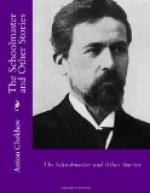“At last,” sighed Abogin, reaching towards the door-handle. “Let us go, please.”
The doctor started, glanced at him, and remembered. . . .
“Why, I have told you already that I can’t go!” he said, growing more animated. “How strange!”
“Doctor, I am not a stone, I fully understand your position . . . I feel for you,” Abogin said in an imploring voice, laying his hand on his scarf. “But I am not asking you for myself. My wife is dying. If you had heard that cry, if you had seen her face, you would understand my pertinacity. My God, I thought you had gone to get ready! Doctor, time is precious. Let us go, I entreat you.”
“I cannot go,” said Kirilov emphatically and he took a step into the drawing-room.
Abogin followed him and caught hold of his sleeve.
“You are in sorrow, I understand. But I’m not asking you to a case of toothache, or to a consultation, but to save a human life!” he went on entreating like a beggar. “Life comes before any personal sorrow! Come, I ask for courage, for heroism! For the love of humanity!”
“Humanity—that cuts both ways,” Kirilov said irritably. “In the name of humanity I beg you not to take me. And how queer it is, really! I can hardly stand and you talk to me about humanity! I am fit for nothing just now. . . . Nothing will induce me to go, and I can’t leave my wife alone. No, no. . .”
Kirilov waved his hands and staggered back.
“And . . . and don’t ask me,” he went on in a tone of alarm. “Excuse me. By No. XIII of the regulations I am obliged to go and you have the right to drag me by my collar . . . drag me if you like, but . . . I am not fit . . . I can’t even speak . . . excuse me.”
“There is no need to take that tone to me, doctor!” said Abogin, again taking the doctor by his sleeve. “What do I care about No. XIII! To force you against your will I have no right whatever. If you will, come; if you will not—God forgive you; but I am not appealing to your will, but to your feelings. A young woman is dying. You were just speaking of the death of your son. Who should understand my horror if not you?”
Abogin’s voice quivered with emotion; that quiver and his tone were far more persuasive than his words. Abogin was sincere, but it was remarkable that whatever he said his words sounded stilted, soulless, and inappropriately flowery, and even seemed an outrage on the atmosphere of the doctor’s home and on the woman who was somewhere dying. He felt this himself, and so, afraid of not being understood, did his utmost to put softness and tenderness into his voice so that the sincerity of his tone might prevail if his words did not. As a rule, however fine and deep a phrase may be, it only affects the indifferent, and cannot fully satisfy those who are happy or unhappy; that is why dumbness is most often the highest expression of happiness or unhappiness; lovers understand each other better when they are silent, and a fervent, passionate speech delivered by the grave only touches outsiders, while to the widow and children of the dead man it seems cold and trivial.




